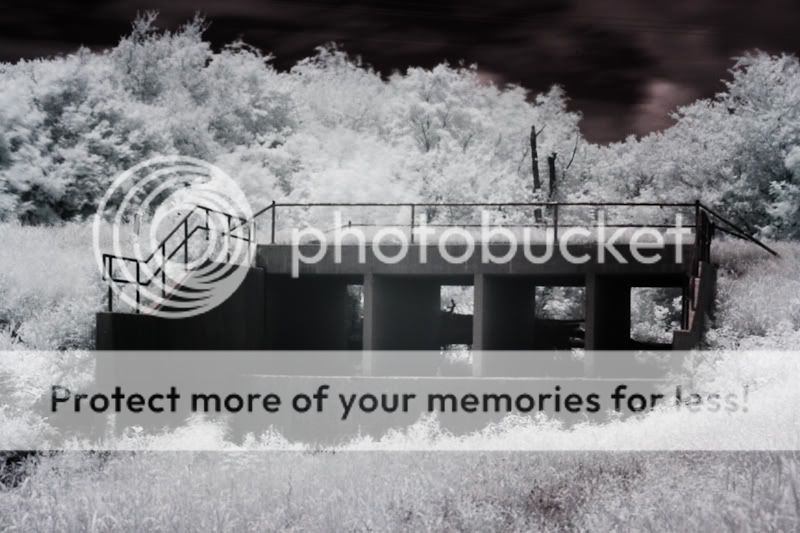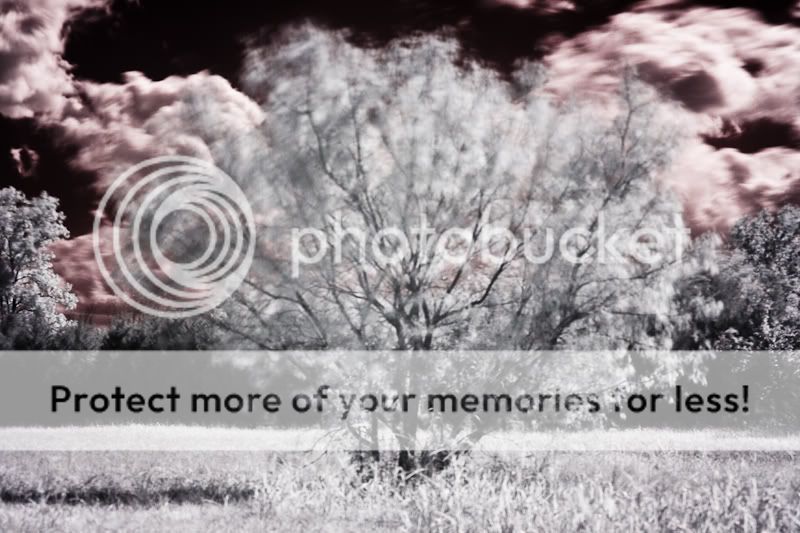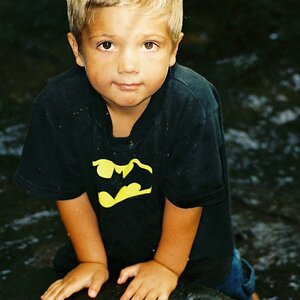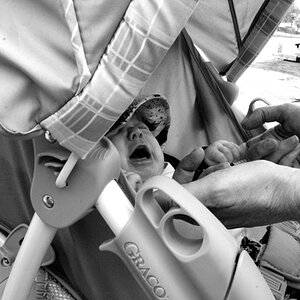Navigation
Install the app
How to install the app on iOS
Follow along with the video below to see how to install our site as a web app on your home screen.

Note: This feature currently requires accessing the site using the built-in Safari browser.
More options
You are using an out of date browser. It may not display this or other websites correctly.
You should upgrade or use an alternative browser.
You should upgrade or use an alternative browser.
Infrared PhotoGraphy!!
- Thread starter Almas1
- Start date
ann
No longer a newbie, moving up!
- Joined
- May 14, 2007
- Messages
- 4,263
- Reaction score
- 189
- Can others edit my Photos
- Photos NOT OK to edit
using a converted camera will allow hand held shooting.
One can use an IR filter with some older cameras but the times will be long and you will need a tripod.
one is not better than another, just different.
Also, if you doing color you might want to do some research about which camera sensors will give you the "looK" you desire as they aren't the same. Black and white doesn't bring that into the equation.
One can use an IR filter with some older cameras but the times will be long and you will need a tripod.
one is not better than another, just different.
Also, if you doing color you might want to do some research about which camera sensors will give you the "looK" you desire as they aren't the same. Black and white doesn't bring that into the equation.
Josh66
Been spending a lot of time on here!
- Joined
- Oct 31, 2007
- Messages
- 14,593
- Reaction score
- 1,239
- Location
- Cedar Hill, Texas
- Can others edit my Photos
- Photos NOT OK to edit
Depending on your camera, IR exposures (using a filter) can be quite long. On the 350D (which is supposed to be pretty good for IR), my shutter speeds are usually around 10 seconds.
It varies from camera to camera due to the differences in the filter on top of the sensor, which blocks a lot of IR.
A conversion would be really cool - but are you sure you love IR that much? Enough to have a camera that can do nothing but IR?
Here are two examples (well, maybe 3) from the 350D:


I missed the focus on that one... I fixed the focus in the next one, but screwed up the composition...

Those are all 'color'. All I did was correct the WB and mess with the curves a little.
These were shot with a filter - not a converted camera. Exif should be intact.
It varies from camera to camera due to the differences in the filter on top of the sensor, which blocks a lot of IR.
A conversion would be really cool - but are you sure you love IR that much? Enough to have a camera that can do nothing but IR?
Here are two examples (well, maybe 3) from the 350D:


I missed the focus on that one... I fixed the focus in the next one, but screwed up the composition...

Those are all 'color'. All I did was correct the WB and mess with the curves a little.
These were shot with a filter - not a converted camera. Exif should be intact.
dxqcanada
Been spending a lot of time on here!
- Joined
- Dec 4, 2008
- Messages
- 7,821
- Reaction score
- 1,673
- Location
- Woodbridge, Ontario, Canada
- Can others edit my Photos
- Photos OK to edit
Infrared Film.
I am assuming you are referring to a Digital Camera.
The sensor has to be sensitive to the infrared end of the light spectrum. Most Digital Camera's have an IR filter to cut out that portion.
Some Digital Camera's filters cut less than others.
A Digital Camera with the IR filter removed will capture that end of the spectrum.
A filter will be used to cut out the rest of the light.
I think Infrared Film still is better, as it is specifically designed to capture that wavelength of light.
I am assuming you are referring to a Digital Camera.
The sensor has to be sensitive to the infrared end of the light spectrum. Most Digital Camera's have an IR filter to cut out that portion.
Some Digital Camera's filters cut less than others.
A Digital Camera with the IR filter removed will capture that end of the spectrum.
A filter will be used to cut out the rest of the light.
I think Infrared Film still is better, as it is specifically designed to capture that wavelength of light.
Josh66
Been spending a lot of time on here!
- Joined
- Oct 31, 2007
- Messages
- 14,593
- Reaction score
- 1,239
- Location
- Cedar Hill, Texas
- Can others edit my Photos
- Photos NOT OK to edit
All digital cameras are sensitive to IR. Some are just more sensitive than others.The sensor has to be sensitive to the infrared end of the light spectrum. Most Digital Camera's have an IR filter to cut out that portion.
Some Digital Camera's filters cut less than others.
This is because of the IR cut-off filter, some are 'better' than others - and that's the reason for the long exposures. 'Better' filter = longer exposure.
EDIT - If you want to test whether or not your camera is sensitive to IR (it should be, a little at least) - grab your TV remote, aim it at your camera, press any button. If you have live view, you'll be able to see it right away. If you don't, you'll have to take a picture while holding the button down. You should be able to see the IR light from the remote.
I think Infrared Film still is better, as it is specifically designed to capture that wavelength of light.
I'm sure you're right. I haven't shot any IR film yet - mostly because I don't process my own film yet, and I'm not really sure where to send it...
As a general rule - do B&W labs do IR?
Last edited:
dxqcanada
Been spending a lot of time on here!
- Joined
- Dec 4, 2008
- Messages
- 7,821
- Reaction score
- 1,673
- Location
- Woodbridge, Ontario, Canada
- Can others edit my Photos
- Photos OK to edit
Ah, that's what I meant ... typo in my comment about the sensor.
Some labs are able to handle it, if they have developing machines that do not expose the film to any infrared light (many do).
I have always developed the film myself.
I have use Kodak High Speed, Ilford, and Konica infrared films, and there is nothing quiet like it. The high grain of the Kodak makes a nice additional affect.
Some labs are able to handle it, if they have developing machines that do not expose the film to any infrared light (many do).
I have always developed the film myself.
I have use Kodak High Speed, Ilford, and Konica infrared films, and there is nothing quiet like it. The high grain of the Kodak makes a nice additional affect.
dxqcanada
Been spending a lot of time on here!
- Joined
- Dec 4, 2008
- Messages
- 7,821
- Reaction score
- 1,673
- Location
- Woodbridge, Ontario, Canada
- Can others edit my Photos
- Photos OK to edit
This is my local lab - Silvano Colour Lab
They do handle Infrared film.
Color and B&W Film Processing - Silvano Imaging (We Still Process Film)
They do handle Infrared film.
Color and B&W Film Processing - Silvano Imaging (We Still Process Film)
Josh66
Been spending a lot of time on here!
- Joined
- Oct 31, 2007
- Messages
- 14,593
- Reaction score
- 1,239
- Location
- Cedar Hill, Texas
- Can others edit my Photos
- Photos NOT OK to edit
Good to know. I'll see what I can find in the States... I'm sure the shipping to Canada will be much higher, lol.
dxqcanada
Been spending a lot of time on here!
- Joined
- Dec 4, 2008
- Messages
- 7,821
- Reaction score
- 1,673
- Location
- Woodbridge, Ontario, Canada
- Can others edit my Photos
- Photos OK to edit
—NOTICE OF DISCONTINUANCE—
KODAK High-Speed Infrared Film / HIE
Due to declining demand, KODAK High-Speed Infrared
Film / HIE has been discontinued, effective YE 2007.
KODAK High-Speed Infrared Film / HIE
Due to declining demand, KODAK High-Speed Infrared
Film / HIE has been discontinued, effective YE 2007.
dxqcanada
Been spending a lot of time on here!
- Joined
- Dec 4, 2008
- Messages
- 7,821
- Reaction score
- 1,673
- Location
- Woodbridge, Ontario, Canada
- Can others edit my Photos
- Photos OK to edit
Josh66
Been spending a lot of time on here!
- Joined
- Oct 31, 2007
- Messages
- 14,593
- Reaction score
- 1,239
- Location
- Cedar Hill, Texas
- Can others edit my Photos
- Photos NOT OK to edit
I believe Kodak has stopped making IR film, you might try freestyle to see what they are carrying.
And i would agree film certainly has a different look
Just did a quick check - B&H & Freestyle have mostly the same selection.
Rollei, Ilford & Efke appear to be the only IR players left.
Any preference? I've shot Efke before (not IR) and thought it was OK. No direct experience with Rollei or Ilford though.
dxqcanada
Been spending a lot of time on here!
- Joined
- Dec 4, 2008
- Messages
- 7,821
- Reaction score
- 1,673
- Location
- Woodbridge, Ontario, Canada
- Can others edit my Photos
- Photos OK to edit
So getting back to the question ... removing the IR filter from the camera + a filter.
Josh66
Been spending a lot of time on here!
- Joined
- Oct 31, 2007
- Messages
- 14,593
- Reaction score
- 1,239
- Location
- Cedar Hill, Texas
- Can others edit my Photos
- Photos NOT OK to edit
Conversion is permanent, a filter is not.
I think that sums it up pretty good. Do you love IR enough to devote a body to nothing but IR? If yes, maybe a conversion is for you.
Personally, I'll stick with my filters...
I think that sums it up pretty good. Do you love IR enough to devote a body to nothing but IR? If yes, maybe a conversion is for you.
Personally, I'll stick with my filters...
dxqcanada
Been spending a lot of time on here!
- Joined
- Dec 4, 2008
- Messages
- 7,821
- Reaction score
- 1,673
- Location
- Woodbridge, Ontario, Canada
- Can others edit my Photos
- Photos OK to edit
That's why you have two bodies.
Similar threads
- Replies
- 12
- Views
- 1K
- Replies
- 2
- Views
- 187










![[No title]](/data/xfmg/thumbnail/32/32155-5dfb2c8aee58498ba1862d4f34389669.jpg?1619735234)
![[No title]](/data/xfmg/thumbnail/33/33422-d1097b04586502aba932c8d5409d8026.jpg?1619735961)